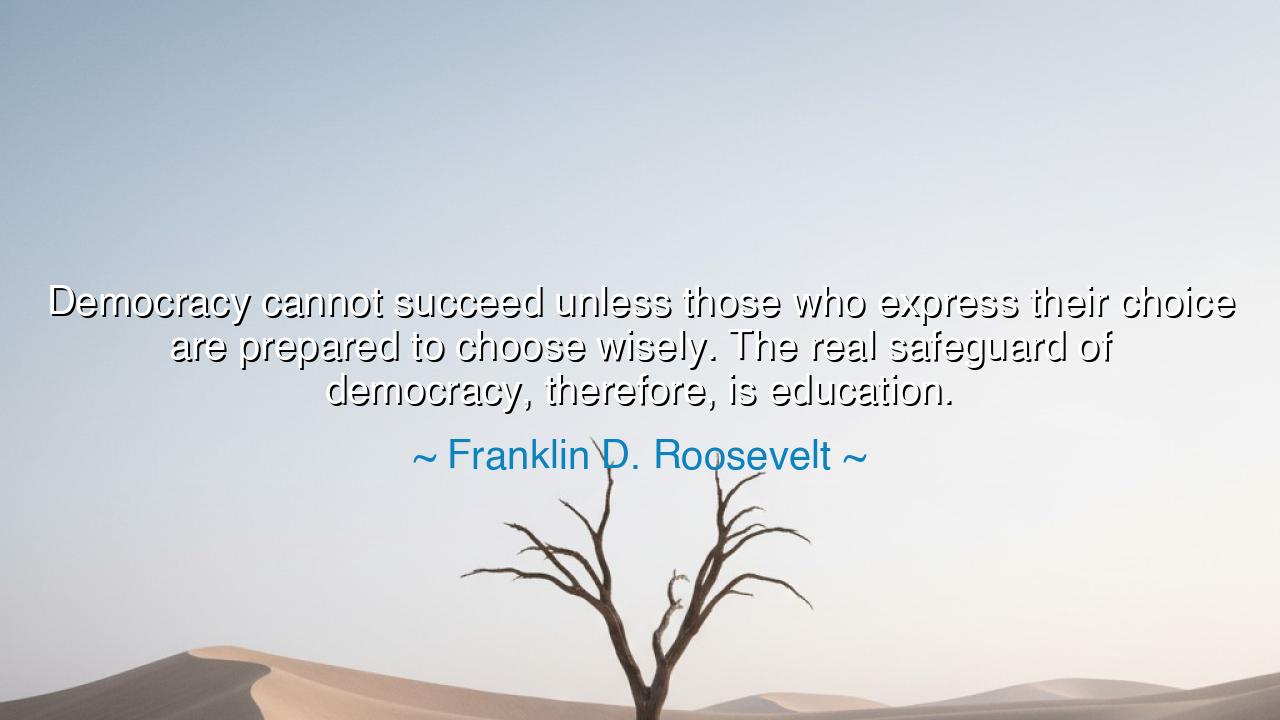
Democracy cannot succeed unless those who express their choice
Democracy cannot succeed unless those who express their choice are prepared to choose wisely. The real safeguard of democracy, therefore, is education.






“Democracy cannot succeed unless those who express their choice are prepared to choose wisely. The real safeguard of democracy, therefore, is education.” Thus spoke Franklin Delano Roosevelt, the leader who guided his nation through the storms of depression and war. His words shine like a beacon, revealing that the strength of democracy does not rest in its rituals alone—the casting of ballots, the speeches of candidates, the machinery of government—but in the wisdom of its people. For without education, the vote is but a shadow, easily swayed by falsehoods, passions, and manipulation. With it, the vote becomes the sharp instrument of justice and freedom.
The meaning of this saying is profound. Democracy is unlike monarchy or tyranny, for it entrusts power not to one ruler but to the many. Yet this gift is also a burden: the people must think, must weigh, must judge. If the people are ignorant, their choices will be guided by fear, prejudice, or deception, and democracy will become its own destroyer. Roosevelt declares that the true safeguard is not law or army or constitution, but the schooling of the mind and spirit. For only an educated people can tell truth from lies, wisdom from folly, and justice from corruption.
The ancients understood this truth long before Roosevelt gave it words. Aristotle warned that democracy decays into mob rule when citizens are ignorant of virtue. The founders of Athens required education in philosophy, rhetoric, and civic duty, knowing that without it, the Assembly would fall prey to demagogues. The Romans, too, saw the danger when their citizens ceased to value learning, and bread and circuses replaced wisdom and civic virtue. Thus history proclaims what Roosevelt declared anew: education is the guardian of freedom.
History offers striking examples. In the 20th century, the rise of fascism in Europe showed how uneducated and desperate populations could be deceived by false promises. Leaders like Hitler and Mussolini preyed upon ignorance and fear, turning nations against themselves. Meanwhile, in America, Roosevelt invested in public education and libraries, understanding that a nation enduring hardship must still feed the minds of its people if it wished to remain free. It was this foresight that helped the United States resist tyranny and remain a beacon of democracy during its darkest hours.
But education, as Roosevelt implies, is not only knowledge of numbers and letters. It is the cultivation of wisdom, the teaching of history, the practice of critical thought, the awakening of conscience. For an educated voter does not only ask, “What is good for me?” but also, “What is just for all?” A truly educated people cannot easily be deceived by hatred or bound by chains of propaganda. Their freedom rests not in the ballot box alone, but in the clarity of the mind that guides the hand which casts the vote.
The lesson for us is clear and urgent. If we would preserve democracy, we must preserve education—not as a privilege for the few, but as the birthright of all. Parents, nourish your children not only with food for the body, but with knowledge for the soul. Teachers, remember that your work is the work of guardianship, for in every mind you awaken, you strengthen the fortress of freedom. Citizens, never cease to learn, for the struggle of democracy is eternal, and ignorance is ever its greatest enemy.
So let Roosevelt’s words resound across the generations: “The real safeguard of democracy… is education.” Remember that ballots without wisdom are like swords without skill—they may harm their wielder more than the foe. But when sharpened by learning, guided by understanding, and tempered by justice, the power of the people becomes invincible. Let us, then, be students all our lives, for the price of liberty is not only vigilance, but wisdom—and wisdom is born only through education.






AAdministratorAdministrator
Welcome, honored guests. Please leave a comment, we will respond soon